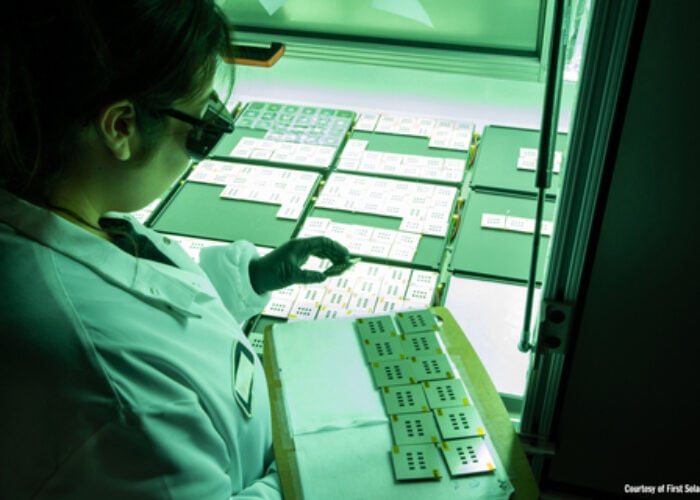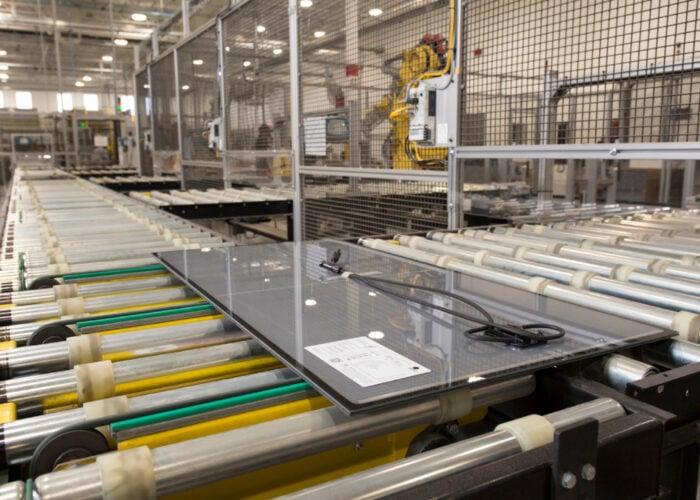Updated: The US International Trade Commission (ITC) has ruled that an investigation into anti-dumping and countervailing duties for solar cell products from China and Taiwan will go ahead, following a preliminary phase vote in Washington DC on Friday.
The issue of anti-dumping and countervailing duty on solar cells from Taiwan and China was initiated by a complaint to ITC raised by Frank Asbeck and his company SolarWorld. The complaint, raised in 2013, was the second such complaint in two years brought to ITC by SolarWorld over anti-dumping practises. The 2012 complaint centred on solar cells produced in China, which Asbeck and SolarWorld argued was negatively affecting the competitiveness of PV cells produced in the US.
Try Premium for just $1
- Full premium access for the first month at only $1
- Converts to an annual rate after 30 days unless cancelled
- Cancel anytime during the trial period
Premium Benefits
- Expert industry analysis and interviews
- Digital access to PV Tech Power journal
- Exclusive event discounts
Or get the full Premium subscription right away
Or continue reading this article for free
The most recent complaint focused on the alleged practise of companies circumventing duties on cells produced in China by instead using manufacturing facilities in Taiwan.
Despite poor weather conditions which brought much of the east cost of the US to a halt the US ITC opened on Friday at 10:45 Eastern Standard Time.
Speaking to PV Tech earlier this month, Richard Weiner of law firm Sidley Austin, who is representing the Chinese manufacturers, said he expected the case to continue.
“The standard of review at the ITC in the preliminary phase is very low,” he said. “The bar they have to step over is simply that there is a reasonable indication of material injury. At the end [of the investigation] they have to prove injury as a result of these imports. As a result the vast majority of cases are continued and it is determined later on if there is an injury. So statistically speaking, unfortunately, we have to expect this to go forward.
In a statement following the vote, Weiner said: “We remain convinced that fairly traded imported solar products from China and Taiwan are vital for America to continue its shift away from fossil fuels and that SolarWorld’s marketplace failures are entirely of its own making. This investigation now shifts to the US Department of Commerce where we will continue to oppose SolarWorld’s efforts to close the US market, a market that, in any event, it has no hope of supplying.”
Weiner confirmed the result of the vote to PV Tech.
As a result of the US ITC preliminary determinations, the US Department of Commerce is expected to continue its investigations on imports, which a preliminary countervailing duty determination due on or around March 26, 2014, and its antidumping duty determinations due on or about around 9 June, 2014, according to the US ITC statement.
According to Taiwan-based market research firm, EnergyTrend Taiwan made solar cell shipment were around 6.5GW in 2013, in which the major export countries were China, Japan, Germany, US, Malaysia, and UK, representing 83% of total shipmentS in 2013.
However, EnergyTrend said that although Taiwan cell shipments directly to the US accounted for around 5% of the 6.5GW total last year, around 50% of the total headed indirectly to the US via Chinese module manufacturers.
“Judging from previous cases, anti-dumping duty usually presses manufacturers into severe challenges,” said Arthur Hsu, research manager at EnergyTrend. “As the investigation result will profoundly affect Taiwanese and Chinese manufacturers’ future strategies in the US market, Chinese makers have already turned to the Chinese government for further supports to eliminate potential harm as much as possible and maintain Chinese manufacturers’ best interests in the US market.”
On news of the ITC decision, SolarWorld Industries America claimed in a statement that Chinese PV manufacturers did not have a production cost advantage, while it remained an industry technology leader. However, the Chinese government were sponsoring PV manufacturers in the country via “illegal, export-intensive subsidies and artificially and temporarily low pricing tactics to undermine them.”
“Step by step, US solar producers are returning to a day when they no longer are forced to compete with the government of China,” said Mukesh Dulani, president of SolarWorld Industries America.
However, a report by the US Energy Department's National Renewable Energy Laboratory (NREL) and the Massachusetts Institute of Technology (MIT) in 2013 highlighted that “China's historical advantage in low-cost manufacturing is mainly due to advantages of production scale, and offset by other country-specific factors, such as investment risk and inflation.”
The report noted that Chinese-based manufacturers had a 23% minimum sustainable prices (MSP) advantage over US-based manufacturers in 2013, which tool into account differences in the manufacturing costs of PV modules, wafers, and solar cells within each country.
The Taiwanese government is providing legal and advisory support to Taiwanese solar cell companies embroiled in the investigation.
Additional reporting from Mark Osborne, senior news editor.






